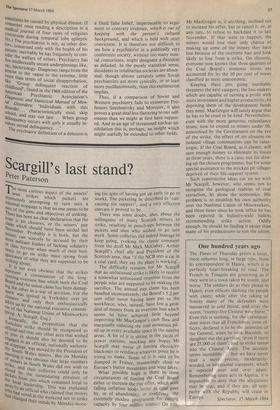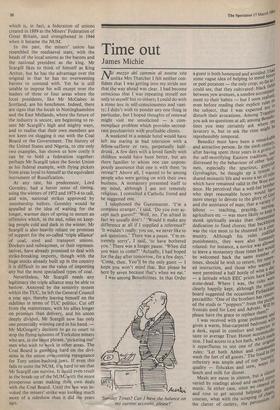Scargill's last stand?
Peter Paterson
The most curious aspect of the miners' area strikes which pickets are strenuously attempting to turn into a national stoppage is that no one seems to be ,surehere of the aims and objectives of striking. has been issue is no clear declaration that the :
Pit closures, or the miners' pay
claim which should have been settled last November. Probably it is both, but the Miners can scarcely be accused by their more militant leaders of lacking solidarity taor class fervour when much of their hesi- ncy to go on strike must spring from Striking about. It is not even obvious that the strikes represent a continuation of the running overtime ban which both thelong-
coal
:I'fr°ard and the union claim has been damag- log ihe other in a war of attrition. For the desk was ignited in Yorkshire over nit taken._ tee Of the Up by the national executive commit- (Pro
he National Union of Mineworkers n. A. Scargill, Esq.) Yorkshire the proposition
riiYorkshire strike should be recogtilitaisted the .cial and that any other area that wished ° Join in engaged in should also be deemed to be etd an official, nationally author's- ii.; st°I3Page, was moved by the President of e South Wales miners. But on Monday tilportung it was obvious that large numbers 13' miners in South Wales did not wish to sel,rotke, and their collieries could only be I. sed 1. h ets furyomthe intimidating presence of Pick . the local leadership. This was explained pits which remained loyal to who by an official who claimed that miners , "o had voted at the weekend not to strike had changed their minds by Monday morn-
ing (in spite of having got up early to go to work). The picketing he described as 'can- vassing for support', and a very effective canvass it proved to be.
There was some doubt, also, about the willingness of many Scottish miners to strike, resulting in punch-ups between the pickets and men who wished to go into work. Some collieries did indeed manage to keep going, evoking the classic comment from the droll Mr Mick McGahey, Arthur Scargill's chief ally and President of the Scottish area, that `if the NCB sees a cat in a coal yard, they say the place is working'.
The difficulty remains for Mr Scargill that an unfocussed strike is likely to receive a somewhat unfocussed response from the people who are supposed to be making the sacrifice. The annual pay claim has been handled incompetently, the Board's 5.2 per cent offer never having been put to the workforce, who, instead, have lost a great deal of money from an overtime ban which seems to have achieved little beyond improving Mr MacGregor's cash flow and marginally reducing the coal mountain pil- ed up in every available space in the mining areas. A lot of it is sitting in the yards of power stations, mocking any hopes Mr Scargill may nurse of forcing electricity blackouts to reinforce whatever point he is trying to make. Some of it is said to be dumped in France, reassuringly close to Europe's butter mountains and wine lakes.
What possible hope is there in these circumstances of forcing the Coal Board either to increase the ray offer, which with falling inflation looks better as tjme goes by, or of abandonin,l, or modifying, the extremely modest programme for cutting capacity by four million tonne,: On pay,
Mr MacGregor is, if anything, inclined not to increase his offer, but to cancel it, or, at any rate, to refuse to backdate it to last November. If that were to happen, the miners would lose their only chance of making up some of the money they have lost because of the overtime ban and look likely to lose from a strike. On closures, everyone now knows that three quarters of the Coal Board's immense losses are accounted for by the 10 per cent of mines classified as most uneconomic.
Keeping these pits going inevitably threatens the next category, the loss-makers which are capable of turning a profit with more investment and higher productivity, by depriving them of the development funds they need. MacGregor will surely argue that he has to be cruel to be kind. Nevertheless, even with the more generous redundancy terms, now to extend to miners under 50, announced by the Government on the eve of the strike, the effect of pit closures on isolated village communities can be catas- tropic. If the Coal Board, as it claims, will save enough money to eliminate its losses in three years, there is a case, not for slow- ing up the closure programme, but for some special assistance to the stricken pit villages deprived of their life-support system.
Such constructive ideas cut no ice with Mr Scargill, however, who seems not to recognise the geological realities of coal extraction, let alone the economics. His problem is to establish his own authority over the National Union of Mineworkers, and three times since he took office he has been rejected in industry-wide ballots recommending strike action. Oddly enough, he should be finding it easier than many of his predecessors to run the union,
which is, in fact, a federation of unions created in 1889 as the Miners' Federation of Great Britain, and strengthened in 1944 when it became the NUM.
In the past, the miners' union has resembled the mediaeval state, with the heads of the local unions as the barons and the national president as the king. Mr Scargill likes to think of himself as King Arthur, but he has the advantage over the original in that he has no overweening barons to contend with. Yet he is still unable to impose his will except over the leaders of three or four areas where the local presidents, like Mr McGahey in Scotland, are his henchmen. Indeed, there are signs that the locals in Nottinghamshire and the East Midlands, where the future of the industry is secure, are beginning to re- sent Mr Scargill's high and mighty ways, and to realise that their own members are not keen on slugging it out with the Coal Board or the Government. The history of the United States and Nigeria, to cite only two examples, has shown us how costly it can be to hold a federation together: perhaps Mr Scargill takes the Soviet Union as his federal example, with flying pickets from areas loyal to himself as the equivalent instrument of Russification.
At any rate, his predecessor, Lord Gormley, had a better sense of timing, using the winters of 1972 and 1973-4 to call, and win, national strikes approved by membership ballots. Gormley would be appalled at the idea of waiting for the longer, warmer days of spring to mount an offensive which, in the end, relies on keep- ing people cold and dark in the winter. Mr Scargill is also heavily reliant on promises of support for the so-called 'triple alliance' of coal, steel and transport unions. Dockers and railwaymen, or their represen- tatives, have already promised to deal with strike-breaking imports, though with the huge stocks already built up in the country it is difficult to see the value of importing any but the most specialised types of coal.
Nevertheless, Mr Scargill needs any legitimacy the triple alliance may be able to bestow. Annoyed by the seniority system within the TUC, he left the General Council a year ago, thereby leaving himself on the sidelines in terms of TUC politics. Cut off from the mainstream, with his allies longer on promises than delivery, and his union deeply divided, Mr Scargill now has only one potentially winning card in his hand. Mr McGregor's decision to go to court to stop the flying columns of Yorkshire miners who are, in the latest phrase, 'picketing out' men who wish to work in other areas. The Coal Board is gambling hard on the divi- sions in the union overcoming repugnance for Tory union-bashing laws. If even this fails to unite the NUM, it is hard to see that Mr Scargill can survive. It could even result in the break-up of the NUM, with the more prosperous areas making their own deals with the Coal Board. Unitl the law was in- voked the miners' strike was looking much more of a sideshow than it did ten years ago.















































 Previous page
Previous page